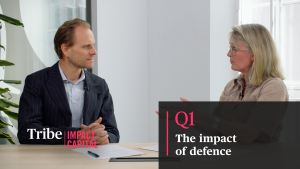CIO conversations - Q2 2023

Catch up with our CIOs, Amy Clarke and Fred Kooij, as they discuss the latest developments in investment and impact in their quarterly update.
In Q2 2023, markets stayed steady as inflation began easing due to lower energy costs. US markets rose on optimism around AI and stable corporate earnings, while Europe saw slower growth.
A major event this quarter was the US resolving its debt ceiling issue, which eased market concerns of a potential default.
On the impact front, the EU advanced new sustainability rules, requiring large companies to consider environmental and human rights impacts. The EU also progressed on AI regulation, and the International Sustainability Standards Board (ISSB) launched a framework to standardise environmental reporting globally.





